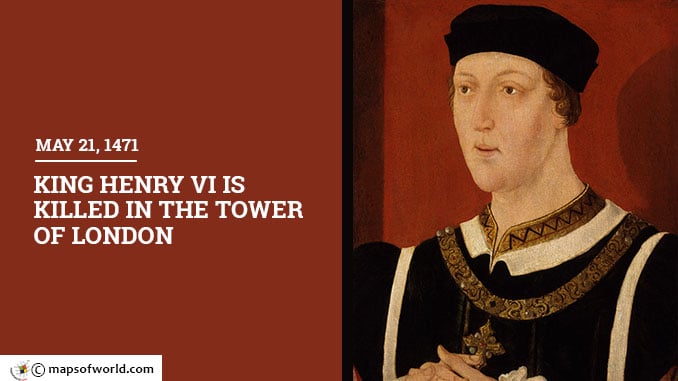On May 21, 1471, Henry VI, King of England and France, was killed in the Tower of London thus bringing an end to the dominance of the House of Lancaster and marking the ascendance of the House of York in England. Henry VI was the only child of Henry V and Catherine of Valois. He was the last of the Lancastrian rulers of England and reigned between 1422 and 1461 and again between 1470 and 1471. Born at Windsor Castle in 1421, Henry VI succeeded his father Henry V and his grandfather Charles VI of France, to the thrones of England and France, when he was only nine months old. In 1429, the infant Henry VI was crowned King of England, and shortly afterwards, in 1431 he became the King of France. France continued to remain a difficult land to administer. The appearance of Joan of Arc in 1428, tormented the English administrators. She was instrumental in rescuing the French Dauphin Charles, who soon came to be crowned at Reims as Charles VII, while she herself burned at the stake. Henry’s minority was dominated by Cardinal Beaufort and the Duke of Gloucester, who were both his uncles but were known for their conflicting opinions and temperaments. They formed part of the regency council that looked after the administrations of England till 1437, when Henry was deemed old enough to rule. The regency of France was administered by the Duke of Bedford, another uncle through his mother. The Duke of Bedford had died a couple of years before Henry took charge and Burgundy broke the alliance with England, leading to a chaotic start of his leadership. Brittany broke free in 1449, Normandy in 1450, and Gascony in 1453 leading up to the end of the Hundred Years’ War in 1453. Henry lost much prestige, authority, and all French territories except for Calais. In 1445, Henry VI married Margaret of Anjou. Henry was a pious man whose cultural patronage and exemplary interests in learning and education would have made him a popular king. He founded the renowned institutions such as Eton and King’s College in Cambridge. His interest in government and administration, however, were sporadic and partisan. As a king, he repeatedly picked the wrong advisors and was powerless to curb the growing power struggles in his court. Domestic unrest such as the Cade rebellion of 1450 further eroded his prestige. In 1453, Henry suffered from a bout of the hereditary mental illness that had plagued the French house of Valois. Richard, Duke of York, was made Protector in 1454. Henry recovered by 1455, by which time a rivalry had developed between the Yorkist and Lancastrian factions. Henry’s queen, Margaret of Anjou, was a headstrong woman who alienated Richard. Instead of discretely negotiating peace, she prepared to fight for the Lancastrian cause. The Wars of the Roses, a civil war between the House of York and the House of Lancaster dominated Henry’s reign. Richard, the Duke of York, slighted by the queen’s high-handedness started asserting his claim to the throne. Richard was related through his mother to Edward III’s second surviving son. The Wars of the Roses thus became a war for the crown and in 1460 Richard captured Henry and forced him to acknowledge Richard’s right to the crown. Henry escaped and the Duke of York was killed at the Battle of Wakefield. Richard’s son took up the cause for York and soon defeated the Lancastrians at Towton in 1461. Edward was crowned Edward IV as Henry and Margaret fled to Scotland. The both were captured by Edward in 1465. In 1470, the Earl of Warwick, an ally of Edward, switched sides and restored Henry briefly to the throne. Edward, however, returned from exile the following year and destroyed the Lancastrian forces in May 1471 at the Battle of Tewkesbury. Henry and Margaret’s only son, Edward, Prince of Wales, died in battle. Henry VI was imprisoned in the Tower of London, and was killed shortly afterwards. Also On This Day: 1688 – English poet Alexander Pope is born. 1881 – The American Red Cross is founded. 1921 – Nobel Peace Prize-winning Soviet scientist, Andrei Sakharov is born. 1927 – Charles A. Lindbergh completes first solo flight across the Atlantic. 1991 – India’s former leader Rajiv Gandhi is killed by assassins.
May 21 1471 – King Henry VI is Killed in the Tower of London
On May 21, 1471, Henry VI, King of England and France, was killed in the Tower of London thus bringing an end to the dominance of the House of Lancaster…
352
